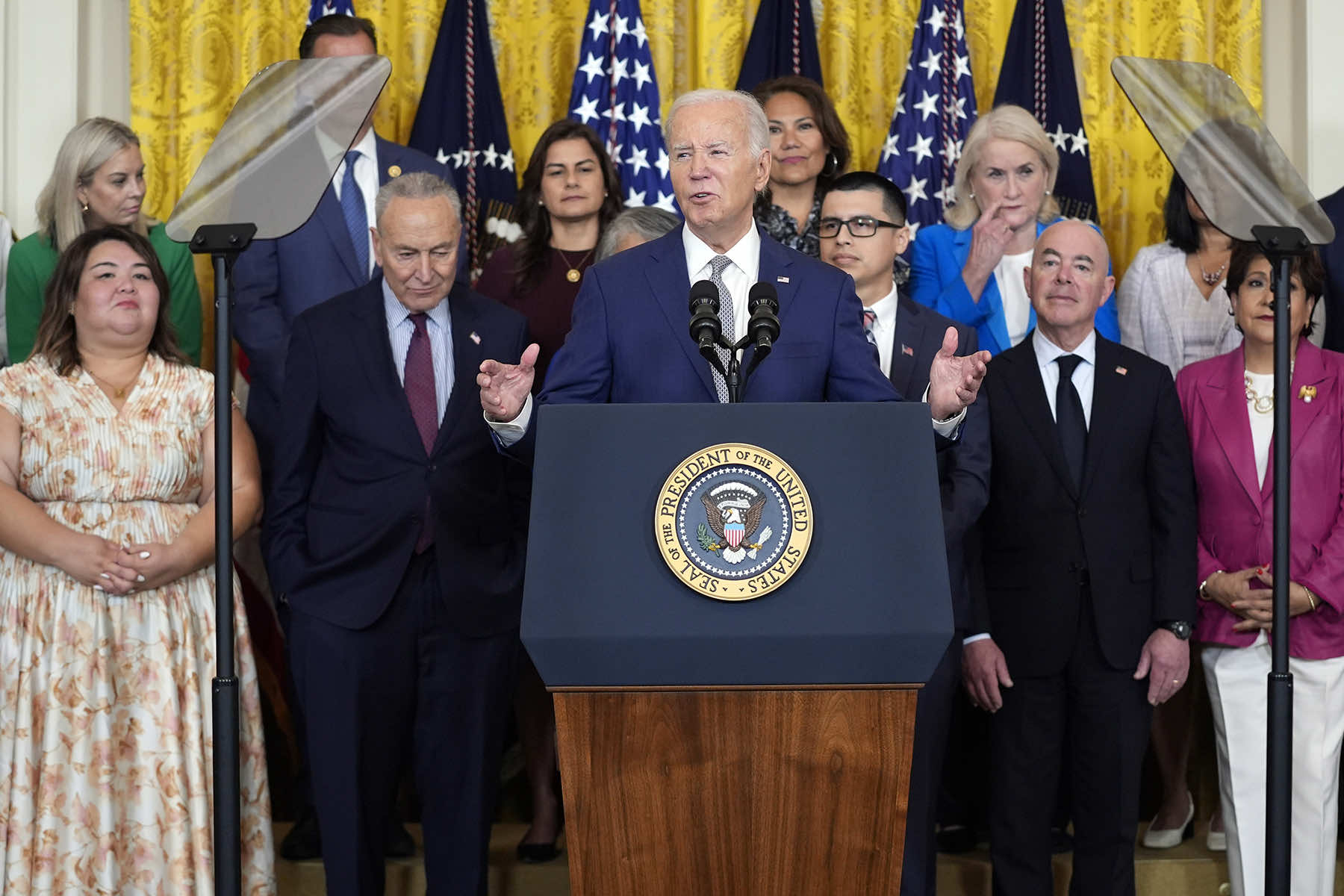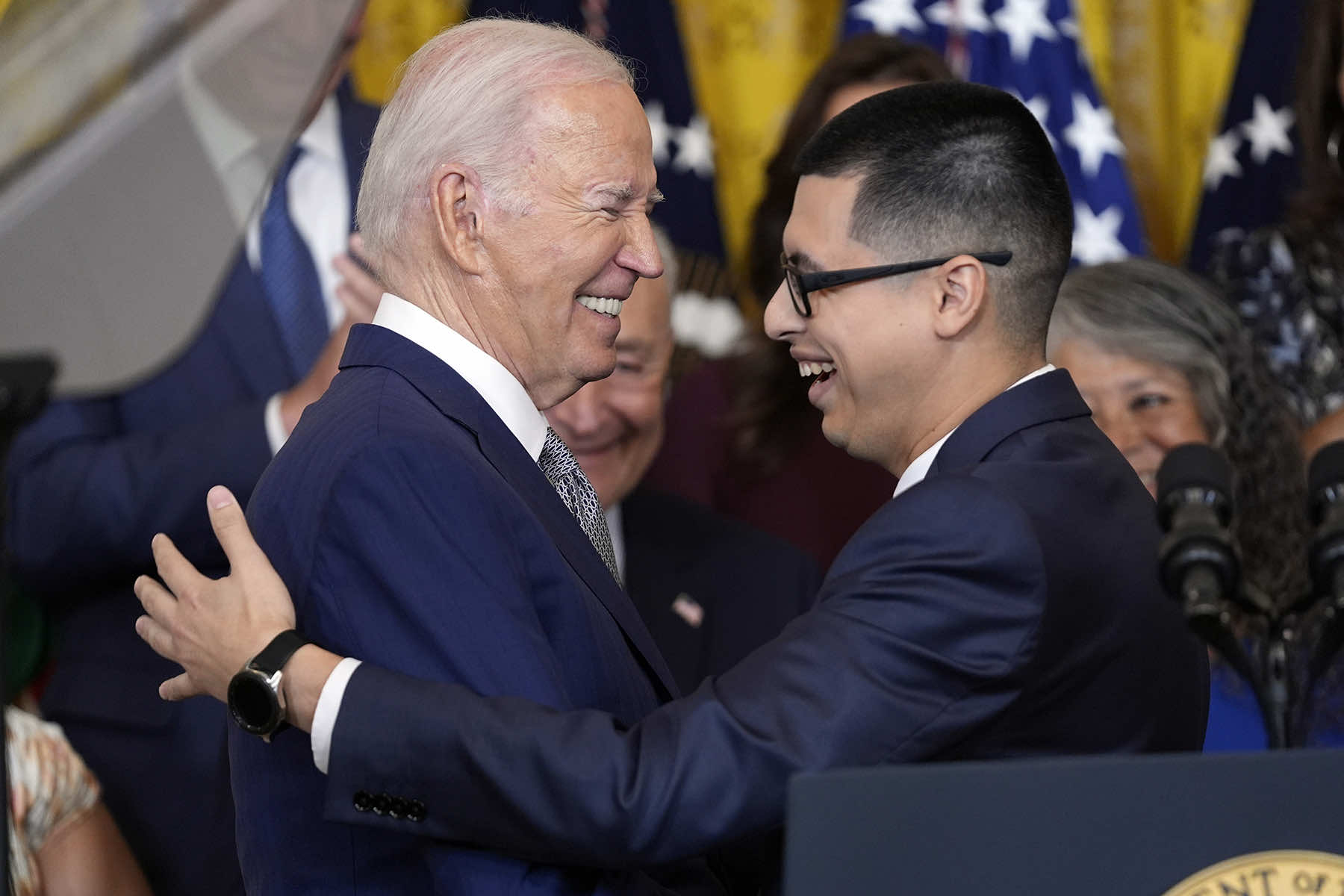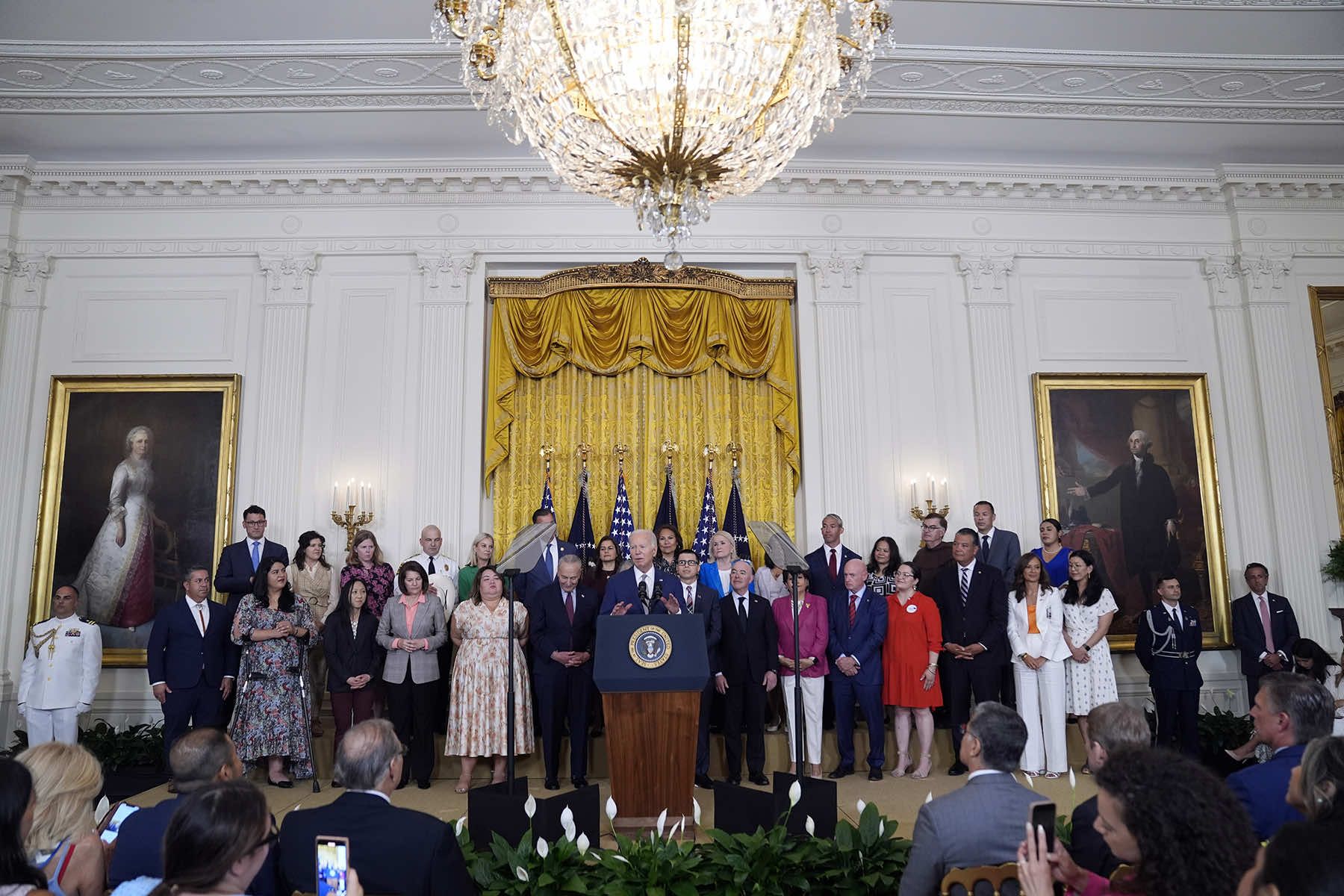
President Joe Biden ordered expansive election-year action on June 18 to offer potential citizenship to hundreds of thousands of immigrants without legal status in the U.S., aiming to balance his recent aggressive crackdown on the southern border that enraged advocates and many Democratic lawmakers.
The president announced that his administration will, in the coming months, allow certain U.S. citizens’ spouses without legal status to apply for permanent residency and eventually citizenship without having to first depart the country. The action by President Biden, a Democrat, could affect upwards of half a million immigrants, according to senior administration officials.
“The Statue of Liberty is not some relic of American history. It still stands for who we are,” President Biden said from a crowded East Room at the White House, filled with advocates, congressional Democrats and immigrants who would be eligible for the program. “But I also refuse to believe that for us to continue to be America that embraces immigration, we have to give up securing our border. They’re false choices.”
President Biden’s action, which amounts to the most expansive federal protection for immigrants in over a decade, sets up a significant political contrast with presumptive GOP presidential nominee Donald Trump, the criminally convicted ex-president, adjudicated rapist, and a documented pathological liar.
Trump’s racially motivated hardline stance on immigration includes a push for mass deportations and rhetoric casting migrants as dangerous criminals “poisoning the blood” of America.
On June 18, President Biden accused “my predecessor” of preying on fears about immigrants as he chastised Trump administration moves, such as a zero-tolerance policy at the southern border that led to the separation of families. But Trump has leaned into his own policies as President Biden has faced disapproval of his handling of immigration throughout his presidency.
At a rally in Racine, Wisconsin, on June 18, Trump proclaimed, “When I’m reelected, Joe Biden’s illegal amnesty plan will be ripped up and thrown out on the very first day that we’re back in office.”
Because the shadow of a second Trump administration looms over President Biden’s new policy, the June 18 actions will set off a months-long sprint by Latino organizations to get as many people to apply for the program as possible before next January.
“For his efforts, hundreds of thousands of married couples will be reunited keeping families together. In addition, DACA recipients now have a pathway to permanent legal status and eventually citizenship,” said Darryl Morin, National President of Forward Latino, a nonprofit advocacy organization based near Milwaukee. “Both of these actions are incredibly popular not only in the Hispanic community but across voters in all parties. This will help more young people use their talents to enrich our communities and strengthen our economy.”
Morin said that President Biden did not only what was right morally, but what was right for our economy. His actions would allow a large number of individuals who have been kept on the sidelines and in the shadows to fully participate in the American economy, providing immediate relief as the nation experiences its greatest workforce shortage in more than a generation.
To qualify for President Biden’s actions, an immigrant must have lived in the United States for 10 years and be married to a U.S. citizen, both as of June 17. If a qualifying immigrant’s application is approved, he or she would have three years to apply for a green card and receive a temporary work permit and be shielded from deportation in the meantime.
About 50,000 noncitizen children with parents who are married to U.S. citizen could also potentially qualify for the process, according to senior administration officials who briefed reporters on the condition of anonymity. There is no requirement on how long the couple must have been married, but no one becomes eligible after June 17. That means immigrants who reach that 10-year mark after June 17 will not qualify for the program, according to the officials.
Senior administration officials said they anticipate the process will be open for applications by the end of the summer. Fees to apply have yet to be determined.
President Biden formally unveiled his plans at a June 18 event at the White House, which also marked the 12th anniversary of the Deferred Action for Childhood Arrivals program, a popular Obama-era directive that offered deportation protections and temporary work permits for young immigrants who lack legal status.
The announcement was welcome news to families with mixed immigration status, such as Antonio and Brenda Valle in Los Angeles. They have been married for nearly 12 years and have two sons who are U.S. citizens, but they have lived with the worry every two years that Brenda Valle’s status as a DACA recipient will not be renewed.
“We can start planning more long-term, for the future, instead of what we can do for the next two years,” she said.
Foday Turay was among those invited to the White House on June 18 for the announcement. He came to the U.S. when he was 10 years old from Sierra Leone, and is now a father to a young son and married to a third-generation U.S. citizen. Although he’s enrolled in DACA and working as an assistant district attorney in Philadelphia, his status doesn’t provide relief from the constant worry of deportation.
“My wife is tremendously impacted by this,” Turay said June 18 before the ceremony. “You know, every day she talks to me about what’s going to happen. What if I get deported? You know, how are we going to raise our son? What country are we going to raise him?”
Republicans were making their own sharp contrasts with President Biden’s plan. In a likely preview of GOP attack campaign ads, Representative Richard Hudson, chair of House Republicans’ campaign arm, criticized the Biden policy a “mass amnesty plan.” Other Republicans, such as Texas Governor Greg Abbott, anticipated that this latest directive would be struck down by the courts.
Senator Marco Rubio, a Florida Republican who is under consideration to be Trump’s pick for vice president, forcefully advocated for legislation in 2012 that would have offered legal status to young immigrants, but on June 18 he said “the world is different” now because immigration numbers have risen.
The June 18 announcement came two weeks after President Biden unveiled a sweeping crackdown at the U.S.-Mexico border that effectively halted asylum claims for those arriving between officially designated ports of entry. Immigrant rights groups have sued the Biden administration over that directive, which a senior administration official said on June 17 had led to fewer border encounters between ports.
President Biden’s allies believe that the approach he is taking with his twin actions on immigration this month will resonate with voters.
“The only party that is being serious about border security is the Democrats. The only party that’s being thoughtful and compassionate about what to do with people who are living in the shadows are the Democrats,” said Sen. Chris Murphy, a Connecticut Democrat who helped author a bipartisan border bill earlier this year. “The Republican Party has decided to take a walk on border security.”
Among advocates, Gustavo Torres, the executive director of CASA, said President Biden’s announcement would energize Latino communities to get out and support him.
“This is what our communities have needed to rally behind President Biden for reelection,” he said.
President Biden also announced new regulations that will allow certain DACA beneficiaries and other young immigrants to more easily qualify for long-established work visas. That would allow qualifying immigrants to have protection that is sturdier than the work permits offered by DACA, which is currently facing legal challenges and is no longer taking new applications.
The power that President Biden is invoking with his June 18 announcement for spouses is not a novel one. The policy would expand on authority used by Presidents George W. Bush and Barack Obama to allow “parole in place” for family members of military members, said Andrea Flores, a former policy adviser in the Obama and Biden administrations who is now a vice president at FWD.us, an immigration advocacy organization.
The parole-in-place process allows qualifying immigrants to get on the path to U.S. permanent residency without leaving the country, removing a common barrier for those without legal status but married to Americans. Flores called it “the biggest win for the immigrant rights movement since the announcement of DACA 12 years ago.”
The same progressives who were infuriated with President Biden’s asylum order praised the president on June 18. Representative Pramila Jayapal, D-WA, who leads the Congressional Progressive Caucus, commended President Biden and said the actions would help keep American families together.
“Many Americans would be shocked to hear that when a U.S. citizen marries an undocumented person, their spouse is not automatically eligible for citizenship,” she said. “Imagine loving someone, marrying them, and then still continuing to fear you would be separated from them.”
HOW DID THINGS WORK BEFORE?
Under U.S. immigration law, if an American marries someone who is not a citizen but is living in the United States, it can be a straightforward process for the spouse to apply for long-term permanent residence — called a green card. But if the spouse has been living in the United States illegally for a long time, that process gets much more complicated.
They often have to leave and apply from their home country. Depending on how long the person has lived in the U.S. without authorization, they could have to stay abroad for three to 10 years before applying to come back. They can seek a waiver to avoid waiting that long abroad, but getting a waiver also is averaging about three and a half years.
They have to go abroad, apply at a consulate — where waits can be extensive — and be permitted back into the U.S. Facing the prospect of leaving their families in America for a lengthy process that might not work, many decide to stay and live in the shadows.
HOW IS PRESIDENT BIDEN CHANGING IMMIGRATION POLICY?
Under the new policy, many spouses without legal status can now apply for lawful permanent residence without leaving the U.S. and eventually get a path to citizenship. But it’s not a blanket approval.
To be eligible, people have to have lived in the U.S. for at least 10 years, not pose a security threat and have been married by June 17, 2024. They would have to apply to the Department of Homeland Security, which considers the applications on a case-by-case basis, the department wrote in a fact sheet describing the new policy. Immigrant spouses cannot have already been admitted or paroled into the country previously.
Applicants will be vetted for previous immigration history, criminal history and more, including potential fraud, President Biden’s announcement said. Once Homeland Security approves an application, the White House said, the person would then have three years to apply for permanent residency and could get work authorization for up to three years.
About 1.1 million immigrants without legal status are married to American citizens in the United States, according to immigration advocacy organization FWD.us. The administration thinks that ultimately about half that number — about 500,000 — could be eligible for this program, plus about 50,000 of their children.
On average, the spouses have lived in the United States for a little over two decades, the White House said. A senior administration official said during a call to brief reporters that they expect the majority of people benefitting from the program will be from Mexico.
HOW DOES THIS FIT IN WITH PRESIDENT BIDEN’S OTHER IMMIGRATION POLICIES?
The Biden administration has pursued a two-pronged strategy on immigration and border security over the past year and a half. On one hand, President Biden has made it much more difficult to qualify for asylum at the southern border and intensified removals of those who don’t qualify to stay. Immigration advocates vilified President Biden’s decision in June to cut off asylum processing after arrivals on the southern border hit a certain number per day. On the other hand, the administration has taken a number of steps to admit people into the country.
In the biggest example, the administration created a program last year allowing people from Cuba, Haiti, Nicaragua and Venezuela to come to the U.S. if they have a financial sponsor, pass a background check and fly into a U.S. airport. As of the end of April, 434,800 people have arrived through that program from those four countries. Many advocates have pushed the administration to do more for immigrants who have lived in the U.S. illegally for decades.
WHAT IS CHANGING IN THE PROGRAM FOR ‘DREAMERS’?
Separate from the policy for migrant spouses, the administration also announced changes designed to help those in the Deferred Action for Childhood Arrivals program qualify more easily for long-established work visas. The Obama administration in 2012 offered people who were brought illegally to the U.S. by their parents as children deportation protections and temporary work permits. Many of them, often known as “Dreamers,” are now parents themselves.
Many companies who employ DACA recipients can apply for them to get a work visa, which is more stable and provides a pathway to permanent residence, said Dan Berger, an immigration fellow at Cornell Law School who co-founded Path2Papers, an organization that helps dreamers pursue work visas and other ways to get legal permanent residency.
But to get the work visa, the DACA recipient must travel abroad, apply and get a waiver to reenter the U.S. Berger said that the waiver process is very slow and offers little guidance, so employers and DACA recipients aren’t eager to try it.
WHAT COMES NEXT?
The Department of Homeland Security has to produce guidance on how the spousal program will work. The program will go into effect by the end of summer, President Joe Biden said during the ceremony on June 18. It will fall to the U.S. Citizenship and Immigration Services, an agency within the Department of Homeland Security, to process all the applications. That agency has historically struggled with funding as it works to reduce backlogs and wait times. Republicans and immigration opponents have intensely criticized the proposal, and opponents are almost certain to sue in an attempt to stop it.

















